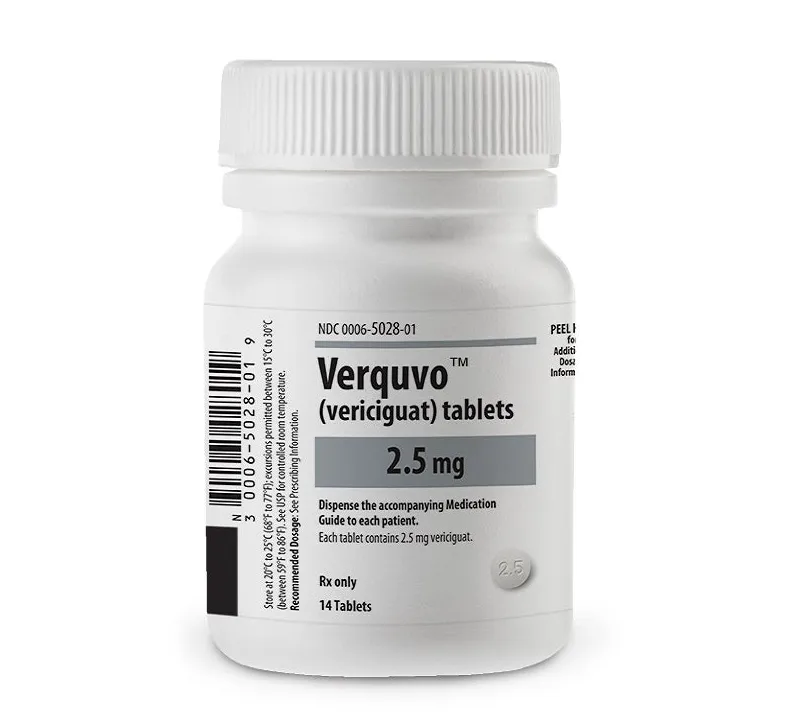Comprehensive Guide to Vericiguat: Uses, Dosage, Side Effects, and More
1. What is Vericiguat?
2. Overview of Vericiguat
Generic Name
Vericiguat
Brand Name
Verquvo, generics
Drug Group
Soluble guanylate cyclase stimulator (cardiovascular)
Commonly Used For
This medication is used to:
- Reduce heart failure hospitalization risk.
- Improve outcomes in HFrEF.
- Enhance cardiac function in chronic heart failure.
Key Characteristics
- Form: Oral tablets (2.5 mg, 5 mg, 10 mg) (detailed in Dosage section).
- Mechanism: Stimulates sGC, increasing cGMP to promote vasodilation and reduce cardiac stress.
- Approval: FDA-approved (2021 for Verquvo) and EMA-approved for HFrEF.

3. Indications and Uses of Vericiguat
Vericiguat is indicated for cardiovascular conditions, leveraging its sGC-stimulating effects to improve heart failure outcomes:
- Heart Failure with Reduced Ejection Fraction (HFrEF): Reduces the risk of cardiovascular death and hospitalization in adults with HFrEF (LVEF ≤45%) following a worsening event, supported by the VICTORIA trial, per cardiology guidelines.
- Chronic Heart Failure Management: Enhances symptom control and quality of life in stable HFrEF patients, used as an adjunct to standard therapy (e.g., ACE inhibitors, beta-blockers).
- Post-Myocardial Infarction Heart Failure: Investigated off-label to manage HFrEF after myocardial infarction, reducing remodeling and improving ejection fraction, with emerging cardiology data.
- Pulmonary Hypertension Associated with Heart Failure: Explored off-label for Group 2 pulmonary hypertension in HFrEF, alleviating right heart strain, supported by pulmonary hypertension studies.
- Diastolic Heart Failure (HFpEF): Used off-label in heart failure with preserved ejection fraction to improve diastolic function, with preliminary evidence from cardiovascular research.
- Cardiomyopathy: Employed off-label in non-ischemic cardiomyopathy to reduce hospitalizations, enhancing long-term prognosis, noted in heart failure cohorts.
- Post-Cardiac Surgery Recovery: Investigated off-label to support cardiac recovery after coronary artery bypass grafting or valve surgery, improving hemodynamics, with surgical cardiology insights.
- Renal Dysfunction in Heart Failure: Explored off-label to mitigate cardiorenal syndrome in HFrEF patients, preserving kidney function, supported by nephrology and cardiology studies.
- Hypertensive Heart Disease: Used off-label to manage heart failure symptoms in patients with uncontrolled hypertension, reducing left ventricular hypertrophy, with hypertension research data.
Note: This drug requires careful titration and monitoring; consult a healthcare provider for individualized treatment plans.
4. Dosage of Vericiguat
Important Note: The dosage of this sGC stimulator must be prescribed by a healthcare provider. Dosing involves gradual titration based on patient tolerance, with adjustments guided by clinical response.
Dosage for Adults
- HFrEF (Initial):
- Start with 2.5 mg once daily, taken with food, for 2 weeks.
- Titration:
- Increase to 5 mg once daily for 2 weeks, then to 10 mg once daily if tolerated, maximum 10 mg/day.
- Maintenance: 10 mg once daily, adjusted for hypotension or side effects.
Dosage for Children
- Not Approved: Not recommended for pediatric use due to lack of safety and efficacy data.
Dosage for Pregnant Women
- Pregnancy Category N (Not Classified): Limited data; use only if benefits outweigh risks. Consult an obstetrician, with fetal monitoring.
Dosage Adjustments
- Renal Impairment: No adjustment needed; monitor in severe cases (eGFR <15 mL/min/1.73 m²).
- Hepatic Impairment:
- Mild (Child-Pugh A): No adjustment; moderate (Child-Pugh B): Use caution; severe (Child-Pugh C): Avoid.
- Elderly: Start with 2.5 mg once daily; titrate slowly to 10 mg if tolerated.
- Concomitant Medications: Adjust if combined with nitrates or PDE-5 inhibitors, increasing hypotension risk.
Additional Considerations
- Take this active ingredient with food to improve absorption and reduce gastric irritation.
- Monitor blood pressure regularly during titration.
5. How to Use Vericiguat
- Administration:
- Swallow tablets whole with a meal or snack, using water; avoid crushing or splitting.
- Take at the same time daily, preferably with breakfast, for consistency.
- Timing: Use once daily, with gradual titration over weeks as directed.
- Monitoring: Watch for dizziness, lightheadedness, or signs of hypotension (e.g., fainting).
- Additional Tips:
- Store at 20–25°C (68–77°F), protecting from moisture and heat.
- Keep out of reach of children due to overdose risk.
- Report severe fatigue, swelling, or signs of allergic reaction immediately.
6. Contraindications for Vericiguat
This drug is contraindicated in:
- Hypersensitivity: Patients with a known allergy to Vericiguat or sGC stimulators.
- Concomitant Use with Nitrates: Avoid due to severe hypotension risk.
- Severe Hepatic Impairment: Contraindicated in Child-Pugh Class C.
- Severe Renal Impairment: Avoid if eGFR <15 mL/min/1.73 m².
7. Warnings & Precautions for Vericiguat
General Warnings
- Hypotension: Risk of symptomatic hypotension, especially during initiation; monitor blood pressure.
- Anemia: May reduce hemoglobin levels; check blood counts regularly.
- Worsening Heart Failure: Risk if titrated too quickly; adjust dose cautiously.
- Syncope: Potential for fainting in volume-depleted patients; ensure hydration.
- Drug Interactions: Enhanced effects with PDE-5 inhibitors; avoid combinations.
Additional Warnings
- Renal Dysfunction: Risk of worsening kidney function in advanced CKD; monitor eGFR.
- Electrolyte Imbalance: Potential hypokalemia or hyperkalemia; assess electrolytes.
- Cardiovascular Events: Rare risk of atrial fibrillation; monitor ECG if symptomatic.
- Liver Injury: Mild elevation of liver enzymes; monitor in chronic use.
- Hypersensitivity Reactions: Rare anaphylaxis; discontinue if swelling occurs.
Use in Specific Populations
- Pregnancy: Category N; avoid unless critical; use alternatives if possible.
- Breastfeeding: Excreted in breast milk; monitor infant for effects.
- Elderly: Higher risk of hypotension; start with lower doses.
- Children: Not approved; avoid use.
- Renal/Hepatic Impairment: Adjust dose; avoid in severe cases.
Additional Precautions
- Inform your doctor about kidney disease, low blood pressure, or medication history before starting this medication.
- Avoid abrupt cessation; taper if discontinuing long-term therapy.
8. Overdose and Management of Vericiguat
Overdose Symptoms
Overdose may cause:
- Dizziness, hypotension, or syncope.
- Severe cases: Acute kidney injury, shock, or cardiac arrest.
- Fatigue, nausea, or headache as early signs.
- Respiratory distress with extremely high doses.
Immediate Actions
- Contact the Medical Team: Seek immediate medical help.
- Supportive Care: Administer IV fluids, monitor vital signs, and correct hypotension with vasopressors if needed.
- Specific Treatment: No antidote; manage symptoms and stabilize hemodynamics.
- Monitor: Check blood pressure, kidney function, and oxygen saturation for 24–48 hours.
Additional Notes
- Overdose risk is moderate; store securely.
- Report persistent symptoms (e.g., severe weakness, confusion) promptly.
9. Side Effects of Vericiguat
Common Side Effects
- Hypotension (10–15%, manageable with hydration)
- Anemia (7–12%, monitored with blood tests)
- Headache (5–10%, relieved with rest)
- Nausea (4–8%, reduced with food)
- Dizziness (3–7%, decreases with tolerance)
These effects may subside with dose adjustment.
Serious Side Effects
Seek immediate medical attention for:
- Cardiovascular: Severe hypotension, syncope, or shock.
- Hematologic: Significant anemia or bleeding.
- Renal: Acute kidney injury or oliguria.
- Hepatic: Jaundice or liver failure.
- Allergic: Rash, angioedema, or anaphylaxis.
Additional Notes
- Regular monitoring for blood pressure, hemoglobin, and kidney function is advised.
- Report any unusual symptoms (e.g., fainting, yellow skin) immediately to a healthcare provider.
10. Drug Interactions with Vericiguat
This active ingredient may interact with:
- Nitrates: Increases hypotension risk; avoid.
- PDE-5 Inhibitors: Enhances vasodilatory effects (e.g., sildenafil); avoid.
- Antihypertensives: Potentiates blood pressure reduction; monitor closely.
- CYP Inhibitors/Inducers: Minimal effect; monitor if combined with strong CYP3A4 agents.
- Diuretics: Increases dehydration risk; adjust dose.
Action: Provide your healthcare provider with a complete list of medications.
11. Patient Education or Lifestyle
- Medication Adherence: Take this sGC stimulator as prescribed to manage heart failure, following the exact titration schedule.
- Monitoring: Report dizziness, swelling, or fatigue immediately.
- Lifestyle: Avoid dehydration; limit alcohol intake.
- Diet: Take with food; maintain a low-sodium diet to support heart health.
- Emergency Awareness: Know signs of hypotension or kidney issues; seek care if present.
- Follow-Up: Schedule regular check-ups every 1–3 months to monitor blood pressure, kidney function, and heart status.
12. Pharmacokinetics of Vericiguat
- Absorption: Well-absorbed orally (peak at 1–4 hours); enhanced with food.
- Distribution: Volume of distribution ~44 L; 98% protein-bound.
- Metabolism: Hepatic via glucuronidation (UGT1A1, UGT1A9) to inactive metabolites.
- Excretion: Primarily renal (53%) as metabolites; fecal (45%); half-life 20–32 hours.
- Half-Life: 20–32 hours, with sustained cardiovascular effects.
13. Pharmacodynamics of Vericiguat
This drug exerts its effects by:
- Stimulating sGC independently of NO levels, enhancing cGMP production.
- Promoting vasodilation, reducing preload and afterload in HFrEF.
- Improving myocardial energetics and preventing adverse remodeling.
- Exhibiting dose-dependent risks of hypotension and anemia.
14. Storage of Vericiguat
- Temperature: Store at 20–25°C (68–77°F); protect from moisture.
- Protection: Keep in original container, away from light.
- Safety: Store out of reach of children due to overdose risk.
- Disposal: Dispose of unused tablets per local regulations or consult a pharmacist.
15. Frequently Asked Questions (FAQs)
Q: What does Vericiguat treat?
A: This medication treats heart failure with reduced ejection fraction.
Q: Can this active ingredient cause dizziness?
A: Yes, dizziness may occur; stay hydrated.
Q: Is Vericiguat safe for children?
A: No, it’s not approved for pediatric use.
Q: How is this drug taken?
A: Orally as tablets once daily with food, as directed.
Q: How long is Vericiguat treatment?
A: Long-term for chronic heart failure management.
Q: Can I use Vericiguat if pregnant?
A: Yes, with caution; consult a doctor.
16. Regulatory Information
This medication is approved by:
- U.S. Food and Drug Administration (FDA): Approved in 2021 (Verquvo) for HFrEF.
- European Medicines Agency (EMA): Approved for HFrEF management.
- Other Agencies: Approved globally for heart failure; consult local guidelines.
17. References
- U.S. Food and Drug Administration (FDA). (2023). Verquvo (Vericiguat) Prescribing Information.
- Official FDA documentation detailing the drug’s approved uses, dosage, and safety.
- European Medicines Agency (EMA). (2023). Vericiguat Summary of Product Characteristics.
- EMA’s comprehensive information on the medication’s indications and precautions in Europe.
- National Institutes of Health (NIH). (2023). Vericiguat: MedlinePlus Drug Information.
- NIH resource providing detailed information on the drug’s uses, side effects, and precautions.
- World Health Organization (WHO). (2023). WHO Guidelines on Cardiovascular Diseases: Vericiguat.
- WHO’s recommendations for Vericiguat in heart failure care.
- New England Journal of Medicine. (2021). Vericiguat in Heart Failure.
- Peer-reviewed article on Vericiguat efficacy from the VICTORIA trial (note: access may require a subscription).
